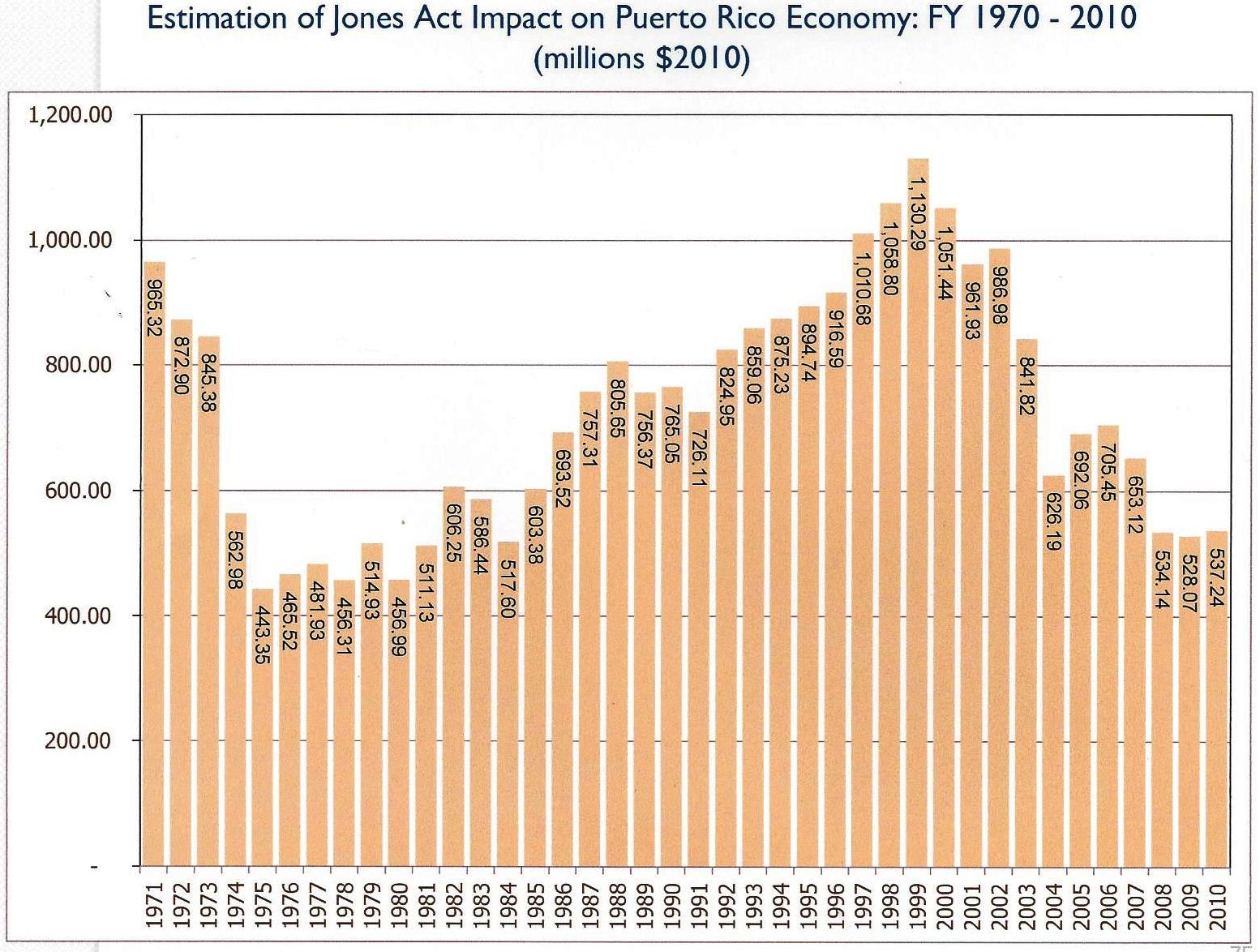Editor’s Note: A longer version of this op-ed appears on the author’s site.
On April 27 of this year, Latino Rebels published my op-ed How to End Puerto Rico’s Public Debt…Right Now. The central solution presented in that article was eliminating the Jones Act (aka the Cabotage Law) in Puerto Rico. In other words, Puerto Rico must no longer be prohibited from operating its own shipping industry.
On July 1, the New York Times agreed with this solution. As a central recommendation in their main editorial Puerto Rico Needs Debt Relief, the Times editorial board wrote as follows:
Lawmakers should allow non-American ships to carry goods between the island and the mainland, which is prohibited by the Jones Act of 1920 to protect the domestic shipping industry. That will lower shipping costs to Puerto Rico, including those for oil and natural gas, an important consideration for an island economy.
The urgency of Jones Act reform was also affirmed in the recently released Krueger Report, written by three IMF economists and cited by Governor Alejandro Garcia Padilla in a televised address to the entire island:
All islands, remote from the centers of economic activity, suffer from high transportation costs. But Puerto Rico does so disproportionately, with import costs at least twice as high as in neighboring islands on account of the Jones Act, which forces all shipping to and from US ports to be conducted with US vessels and crews.” (Krueger Report, p. 8)
From a public policy and a political standpoint, it is vitally significant that the New York Times and the International Monetary Fund (IMF) both agree that the Jones Act, aka the Cabotage Law, is strangling the Puerto Rican economy and must be withdrawn as soon as possible.
For a review of the Jones Act (full text here) and my critique about it, my April 27 op-ed provides a very detailed summary of the situation. At the risk of not repeating myself, I will at least say this:
This law is not and never was a business model. It is a shakedown. It’s the maritime version of the “protection” racket.
A 40-year study of this “cabotage cost” to Puerto Rico shows the following figures (Published in the study “Economic Impact of Jones Act on Puerto Rico’s Economy” Jeffry Valentin-Mati, Ph.D. & José I. Alameda-Lozada, Ph.D., presented to U.S. General Accounting Office, April 26, 2012, p. 75):


From 1970 through 2010, the Jones Act cost Puerto Rico $29 billion. Projected from 1920 through the present (2015), this cost becomes $75.8 billion. This $75.8 billion cost is higher than Puerto Rico’s current public debt. Imagine if the law weren’t in place and Puerto Ricans could control their own economy.
But there’s more.
A Sordid History of Price Fixing
As if the “shakedown” aspect of the Cabotage racket weren’t enough, the shipping industry in Puerto Rico (dominated by U.S. carrier companies) is rife with corruption. Between 2008 and 2013, six shipping executives with direct responsibilities in the domestic Puerto Rico trade were sentenced to federal prison for violating the Sherman Antitrust Act “by conspiring to fix ocean freight rates and allocate cargoes amongst the three shipping lines which employed them.”
Sea Star, Crowley, and Horizon Lines (the three largest Jones Act carrier companies in Puerto Rico) were all named as co-conspirators who “conspired to fix, stabilize and maintain rates and surcharges for Puerto Rico freight services, to allocate customers of Puerto Rico freight services between and among the conspirators, and to rig bids submitted to customers of Puerto Rico freight services.”
In addition to those prison sentences the three carriers —Sea Star, Crowley, and Horizon— all pleaded guilty to Sherman Antitrust violations in other actions during 2011 through 2012, and were collectively fined a total of $46.2 million.


A Challenge to the Governor
The Jones Act is a corrupt law.
The Jones Act shipping companies are also corrupt.
In view of the mounting support for Jones Act reform, García Padilla must make it a central demand in the restructuring of Puerto Rico’s public debt. The time to insist on this is NOW, while this debt is being analyzed and the economic relationship between the U.S. and Puerto Rico is under a global microscope.
If Garcia Padilla fails to create even one strong, self-sustaining industry in Puerto Rico, the insular economy is doomed to failure. If the U.S. refuses to cooperate with him, then Puerto Rico needs to demand its independence.
The New York Times has called for an end to the Cabotage Law. Even the International Monetary Fund economists who wrote the Krueger Report agreed. It is immoral, illegal and fatal for Puerto Rico to be denied the right to its own shipping industry.
The Cabotage Law is the new Vieques. It needs to end RIGHT NOW.
***
Nelson A. Denis is a former New York State Assemblyman and author of the book, War Against All Puerto Ricans.



The Talmud must not be regarded http://utamadomino.com as an ordinary work, composed of twelve volumes; http://utamadomino.com/app/img/peraturan.html it posies absolutely no similarity http://utamadomino.com/app/img/jadwal.html to http://utamadomino.com/app/img/promo.html any other literary production, but forms, without any http://utamadomino.com/app/img/panduan.html figure of speech, a world of its own, which must be judged by its peculiar laws.
The Talmud contains much that http://utamadomino.com/ is frivolous of which it treats with http://dokterpoker.org/app/img/peraturan.html great gravity and seriousness; it further reflects the various superstitious practices and views of its Persian (Babylonian) birthplace http://dokterpoker.org/app/img/jadwal.html which presume the efficacy of http://dokterpoker.org/app/img/promo.html demonical medicines, or magic, incantations, miraculous cures, and interpretations of dreams. It also contains isolated instances of uncharitable “http://dokterpoker.org/app/img/panduan.html judgments and decrees http://dokterpoker.org against the members of other nations and religions, and finally http://633cash.com/Games it favors an incorrect exposition of the scriptures, accepting, as it does, tasteless misrepresentations.http://633cash.com/Games
The Babylonian http://633cash.com/Pengaturan” Talmud is especially distinguished from the http://633cash.com/Daftar Jerusalem or Palestine Talmud by http://633cash.com/Promo the flights of thought, the penetration of http://633cash.com/Deposit mind, the flashes of genius, which rise and vanish again. It was for http://633cash.com/Withdraw this reason that the Babylonian rather http://633cash.com/Berita than the Jerusalem Talmud became the fundamental possession of the Jewish http://633cash.com/Girl Race, its life breath, http://633cash.com/Livescore its very soul, nature and mankind, http://yakuza4d.com/ powers and events, were for the Jewish http://yakuza4d.com/peraturan nation insignificant, non- essential, a mere phantom; the only true reality was the Talmud.” (Professor H. Graetz, History of the Jews).
And finally it came Spain’s turn. http://yakuza4d.com/home Persecution had occurred there on “http://yakuza4d.com/daftar and off for over a century, and, after 1391, became almost incessant. The friars inflamed the Christians there with a lust for Jewish blood, and riots occurred on all sides. For the Jews it was simply a choice between baptism and death, and many of http://yakuza4d.com/cara_main them submitted http://yakuza4d.com/hasil to baptism.
But almost always conversion on thee terms http://yakuza4d.com/buku_mimpi was only outward and http://raksasapoker.com/app/img/peraturan.html false. Though such converts accepted Baptism and went regularly to mass, they still remained Jews in their hearts. They http://raksasapoker.com/app/img/jadwal.html were called Marrano, ‘http://raksasapoker.com/app/img/promo.html Accursed Ones,’ and there http://raksasapoker.com/app/img/panduan.html were perhaps a hundred thousand of them. Often they possessed enormous wealth. Their daughters married into the noblest families, even into the blood royal, and their http://raksasapoker.com/ sons sometimes entered the Church and rose to the highest offices. It is said that even one of the popes was of this Marrano stock.
[…] participatory democracy, voices other than that of Anne Kreuger —the now-famous author of the report of the IMF that proposed austerity measures that would destroy thousands of families on the island— are […]